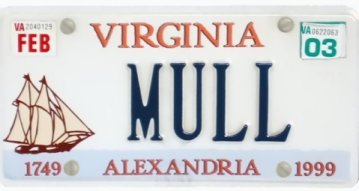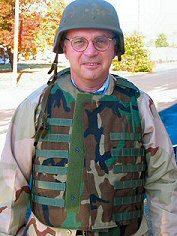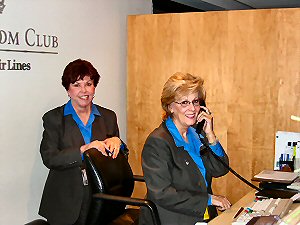Credit:
Adrian is a lawyer with the Department of Defense whose specialty is working with the governments of North Korea and the Vietnam trying to locate the remains of military personnel who are still listed as "Missing in Action." This is a very worthy effort, and Adrian is a very worthy guy.
I've never asked Cronauer if he really started his radio show with "Goooooood Morning, Vietnam" as Robin Williams does in the movie, but we will stipulate - for the next four months or so - that he did.
A former Member of Congress from Minnesota (a Democratic Member of Congress) and current friend and colleague named Gerry Sikorsky suggested the title of these Travelogues in an e-mail.
Both Cronauer and Sikorsky get full credit for the title. The content - for better or worse - is my responsibility. From the Delta Crown Room
Thursday, November 5, 2003
I was at Reagan National Airport waiting to board my flight to JFK when I began to wonder whether I was doing the right thing.
It was Tuesday, October 7, 2003 - exactly four weeks from the night when I received a call from someone in the Administration asking me to go to Baghdad and help with the media and communications effort there.
Notwithstanding my instant agreement, I was warned it might take six to eight weeks to get through the process.
Twenty-eight days later, here I was: DCA to JFK. JFK to Frankfurt. Frankfurt to Kuwait. Kuwait to Baghdad.
All in coach.
I am, as I write this, a full-time civilian employee of the US Department of Defense. As such, I have to follow departmental rules on flights. The departmental rules on flights to Baghdad state, in sum, "Thou shalt fly coach."
Another rule states "Thou shalt fly United or some other 'contract carrier'," but after some negotiations with the approved travel agency, we found a fare on Delta which matched the United fare so my routing is Delta (with the attendant frequent flier miles) from Washington to Frankfurt; Lufthansa to Kuwait City; then military transport (upon which, one presumes, it would be bad form to ask about frequent flier miles) from Kuwait to Baghdad.
I have signed to work with what is known as "regional media" to help representatives cover stories which are important to, for example, the Dallas-Ft. Worth area but would not probably make the NBC Nightly News or the Washington Post.
As an example, there might be a reserve unit from Chicago which is doing great work in helping to rebuild Iraq; but if the reporters can't get to where the unit is - or don't know about the story - then it won't be told.
A reporter sitting in Baghdad has to cover a helicopter being shot down. But that doesn't happen every day, thank God, so my job will be to help them cover other things.
That's what my job is going to be.
In answer to the questions: I have no idea where I will be sleeping, what the working conditions will be or how the media operation is organized.
I will find all those things out when I get there.
After I agreed on the phone to take on this assignment, I thought it would be a good idea to check with the Mullings Director of Standards & Practices.
It was no surprise at all that she was pleased and excited about the opportunity to help the United States.
The Lad was somewhat less sanguine about the prospect, but over the four-weeks he got his mind around the idea and was in pretty good shape when he and his mom dropped me off at the airport.
Dealing with bureaucracies is an art. It requires a gentle-but-constant pressure to keep moving toward whatever goal you are trying to reach.
During Week One of this particular effort, I hadn't even known if I was going to be paid. I expected to be a volunteer and began thinking about who I could get to help fund this adventure.
During an early visit to the Pentagon I was handed a folder with forms totaling about three-quarters of an inch.
"What is all this?" I asked.
Was the approximate conversation.
Then I thought I would be an outside contractor or consultant - which is my normal state of employment - so that I could keep my current contracts and, more importantly, continue to write Mullings.
There is a very wonderful woman at the Pentagon who understands these things. She grandmotherly in appearance and sits behind a desk with a table shooting out from in front of her at 90 degrees.
"Why don't you take a seat there, Mr. Galen, and tell me what your duties are going to be, and then we'll decide on the appropriate status."
I told her. Then she told me that I couldn't do a single thing I was planning to do as an outside contractor.
"As a contractor or consultant you cannot speak on behalf of the government or any department or agency," she said, "nor can you have day-to-day control over government employees. You can have control over other contractors, but not over employees."
"Oh," was my powerful and well-reasoned response.
Hence, my status as a full-time employee.
In addition to my employment status there were an number of other issues to deal with.
Before you can go to Baghdad you have to demonstrate to the Pentagon that you will not be needing immediate dental care or health care by presenting letters from dentists and physicians proving you are in reasonably good health.
I, as it happens, am in very good health if you don't count that pesky by-pass surgery about five years ago.
It also happens that I had some fairly significant dental work already scheduled, so I just moved it up and got it all done including a new set of choppers in advance of my sitting here in Frankfurt.
This is approximately what new smile looks like: The Pentagon is a series of systems which are designed to deal efficiently with large numbers of things - people, trucks, hamburger patties, whatever. But it is not set up to deal with individuals with individual issues.
This is when that gentle-but-steady pressure thing comes in handy.
A week after I got The Call (and had spoken to a variety of Administration communications people about what they had in mind), I met with Dan Senor who is heading up the civilian media effort in Baghdad. He happened to have been in Washington to help with the effort to have the House and Senate pass the $87 Billion supplemental appropriation for Iraq and Afghanistan.
We met at the Starbucks on Pennsylvania Avenue, about a half-block from the White House. He was enthusiastic about getting some additional help, so I set about finding out who was in charge of the paperwork.
In the film, "The Hunt for Red October," the character played by former Senator Fred Thompson asks the Jack Ryan character what the Russians' plan is. "Russians don't take a dump, son, without a plan," is the quote.
Nothing happens in the Federal government, son, without paperwork.
The issue before me was: Who owns the paperwork?
It took three phone calls before I determined it was the White House Liaison office at the Pentagon. One more phone call and I had a number.
I dialed that number which was answered by a very nice young man named Chip.
I informed Chip that I was going to Baghdad and I understood his office owned the process.
"I haven't heard anything about this," he said.
I told him who had called me in the first place and he asked when I would like to go.
I said I didn't want it to take too long, how about something on the order of November 4? That would give me a month to get everything organized. Within that time, in addition to everything else, the MD of S&P and I would take a scheduled trip to Rome, Italy to visit with Ambassador Mel and Mrs. Betty Sembler; and I would take an overnight trip to Birmingham, Alabama for a final speech, this to the Alabama Federation of Republican Women's annual convention.
He thought that time frame might be doable and asked me to come to the Pentagon to get the process started.
He became my keeper and moved the paper through the system. He walked me - literally - through the Pentagon process including the deployment people who issue the travel authorization ("Any class of commercial airline service other than COACH CLASS requires an amendment to these orders in advance of travel"); the people who schedule you to go to get measured for your helmet, flak jacket, boots and camouflage shirt and trousers; and the people at the Pentagon who tell the people in Baghdad you're coming.
Actually, that last works the other way. The people in Baghdad tell the people in the Pentagon whether or not they will accept someone. This is called "Country Clearance" and it is no small matter.
When I went to Ft. Belvoir, which is only about 10 miles from my house, I expected to be treated like I was the last time I was on a military base: Standing in long lines, cranky people shouting at me, demanding to know if I was the dumbest person in my family or were there more like me at home, and all that. Ft. Bragg, 1967 was the only model I had to work from.
The reality was: I was a civilian member of the federal government being processed to take on a role which was not without some danger and I was treated with a great deal of compassion.
In the end, it all got done with a minimum of fuss; I filled out all the forms with relative equanimity; I received my travel orders followed by the discussion about the mode of travel; made all the phone calls to all the family members; heard from everyone that I should be careful; got on a plane and here I am in Frankfurt.
Here's what I looked like when I finished at Ft. Belvoir:
On the "be careful" front, I am not obsessed with the danger, but I am not a fool, either. In addition to what the military is providing, I went out and purchased a vest which can be worn under a shirt. They are not called "bullet-proof vests" any more because, I'm sure, some lawyer realized that nothing can stop every bullet and for liability purposes they are now called "body armor."
My particular body armor - which is packed in my roll-aboard - will stop anything up to and including a .44 magnum round. I don't know whether or not it will be useful from a physical standpoint, but it is already making a difference from a psychological standpoint.
I was more than a little disappointed that it made it through the x-ray machines in Washington and in Frankfurt. I was sort of hoping it would show up and I'd have to pull it out and hold it up for all to see.
I am a garden slug.
------ When we arrived at Reagan National Airport, the MD of S&P said that she would pay for me to upgrade from coach to business on the JFK - FRA (which is the three-letter designator for Frankfurt, not for FRAnce. Paris is CDG for Charles deGaulle) leg.
At the ticket counter, I checked two duffel bags. One was completely filled with drug-store items: I have a three-month supply of everything from Aloe to Zinc. I don't have hemorrhoids, but if I get them, I'm ready.
I spent over $300 at the CVS in Old Town, Alexandria Virginia. In October 2004, the store manager is going to have to explain the drop in year-over-year sales.
The other duffel was filled with clothing, sheets, towels, and electronic gizmology.
I also had my very manly Orvis leather shoulder bag and my usual roll aboard which, to my great surprise, made it all the way with me even changing planes and airlines in Frankfurt. As I have some experience with checking luggage on overseas trips which include a change of airlines, I have a three-day supply of clothes and a three MONTH supply of prescription drugs in my possession.
Nevertheless, when I inquired as to how much it might cost to upgrade that one leg of the trip I was told it would be about, oh, $87 Billion give or take. It was actually going to be on the order of $2,400. We decided that, at those prices, my tender tushie could bear up to a coach seat for the seven-hour flight.
I had steeled myself to this coach business on the grounds that, if I was going to a war zone and was likely to be sleeping in a dormitory setting -
SIDEBAR:
END SIDEBAR
- in a dormitory setting that I would do well to begin the effort by flying in coach for 12 hours and 40 minutes of flying I was about to do.
Upon arriving in New York, I had second thoughts about this egalitarianism and being a man o' the people, and with pretending to be Omar Bradley and all. I went to the Delta Crown Room and this is approximately what I told the two women at the service desk:
"I have been drafted by our government for the second time - 35 years after the first time. I am Platinum Medallion (which requires you to fly 100,000 per year) on Delta and have flown over 93,000 miles already in 2003. I am going to Baghdad for about four months and I would like to fly in business class one last time." Then I flashed them a smile with my new choppers.
One of the women said she wasn't certain she could upgrade me but, as it happened, coach was oversold so if everyone showed up and they needed coach seats a platinum Delta flyer such as myself would be among the first to move to business class. Pending that she would try to move me to an aisle seat in the exit row.
About 20 minutes later, I was paged to the service desk where the very lovely, talented, and brilliant woman told me that, unfortunately, someone had already taken the exit row seat.
BUT �.
She handed me a boarding pass, thus:
I am a garden slug. I cannot help myself.
I tried approximately the same song-and-dance with the gate agent on the Lufthansa flight from Frankfurt to Kuwait City. I showed him my Delta boarding pass which indicates my platinum status and told the guy that Delta had upgraded me and they had suggested I ask if Lufthansa could extend the same courtesy.
I lied. Delta had never said any such thing.
He took my boarding pass and said that if it was full in coach he would upgrade me to business.
Two things: One: Coach was not full. He told me, when boarding began, that he had checked with his supervisor but it was not defensible to upgrade me; however he had moved me to a bulkhead, exit row, aisle so I would have a great deal of room.
The seat, actually, was pretty good, but I suspect he lied, too. He never checked with his supervisor.
Two: There were a lot of kids who were obviously US military transiting, as I was, into Kuwait thence to Iraq. They were all in coach, so I felt a sense of camaraderie with them sitting in the back - even if I was in the first row of coach, in an aisle, at the bulkhead, with plenty of leg room, and an empty seat next to me.
I am a garden slug.
Note: The Iraq Travelogue emails are distributed through the services of Focus Data Solutions, Inc.
Click here to return to the Mullings page



"Good Morning Vietnam," you remember, was a movie about an airman/disc-jockey named Adrian Cronauer. Adrian Cronauer is a real person who is an acquaintance and occassional lunch-date of mine. He does not look like Robin Williams. He looks, by his own description, like Robert Bork.
Chapter 1
It's Not So Much Where You're Going, as How You Get There
Frankfurt, Germany
and
Aboard Lufthansa Flight 636
Frankfurt to Kuwait City
"If you want to be paid, you have to fill them out," I was told.
"I'm being paid? Excellent!"

"It only got the green light this morning," I said.
"Who gave it the green light," he asked?

You know that I am a hotel snob. Remember when I went to Paris in January 2003 I wanted to stay at the George V but ended up staying at a Best Western on the Left Bank. I am one of those people who truly believes that "roughing it" is spending a weekend at a hotel which does not have 24-hour room service. I am not ashamed of this.

